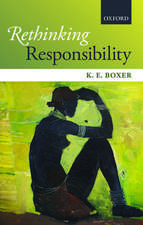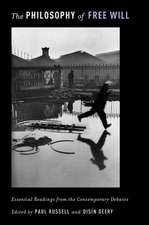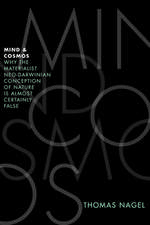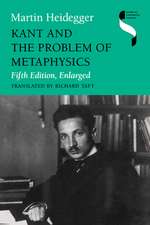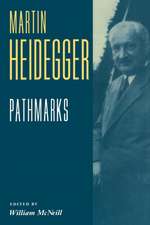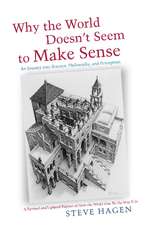Interpretation of Nietzsche`s Second Untimely Meditation: Studies in Continental Thought
Autor Martin Heidegger, Ullrich Haase, Mark Sinclairen Limba Engleză Hardback – 11 sep 2016
Din seria Studies in Continental Thought
-
 Preț: 280.12 lei
Preț: 280.12 lei -
 Preț: 136.59 lei
Preț: 136.59 lei -
 Preț: 174.22 lei
Preț: 174.22 lei -
 Preț: 137.37 lei
Preț: 137.37 lei -
 Preț: 247.15 lei
Preț: 247.15 lei -
 Preț: 198.41 lei
Preț: 198.41 lei -
 Preț: 154.57 lei
Preț: 154.57 lei -
 Preț: 101.93 lei
Preț: 101.93 lei -
 Preț: 153.87 lei
Preț: 153.87 lei -
 Preț: 389.99 lei
Preț: 389.99 lei -
 Preț: 211.96 lei
Preț: 211.96 lei -
 Preț: 306.22 lei
Preț: 306.22 lei -
 Preț: 234.78 lei
Preț: 234.78 lei -
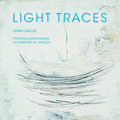 Preț: 160.61 lei
Preț: 160.61 lei -
 Preț: 242.38 lei
Preț: 242.38 lei -
 Preț: 102.86 lei
Preț: 102.86 lei -
 Preț: 377.90 lei
Preț: 377.90 lei -
 Preț: 296.30 lei
Preț: 296.30 lei -
 Preț: 400.38 lei
Preț: 400.38 lei -
 Preț: 165.19 lei
Preț: 165.19 lei -
 Preț: 125.43 lei
Preț: 125.43 lei -
 Preț: 165.56 lei
Preț: 165.56 lei -
 Preț: 123.66 lei
Preț: 123.66 lei -
 Preț: 164.60 lei
Preț: 164.60 lei -
 Preț: 183.28 lei
Preț: 183.28 lei -
 Preț: 159.12 lei
Preț: 159.12 lei -
 Preț: 185.48 lei
Preț: 185.48 lei -
 Preț: 396.72 lei
Preț: 396.72 lei -
 Preț: 162.98 lei
Preț: 162.98 lei -
 Preț: 280.98 lei
Preț: 280.98 lei -
 Preț: 189.22 lei
Preț: 189.22 lei -
 Preț: 226.81 lei
Preț: 226.81 lei -
 Preț: 193.04 lei
Preț: 193.04 lei -
 Preț: 162.69 lei
Preț: 162.69 lei -
 Preț: 186.17 lei
Preț: 186.17 lei -
 Preț: 296.85 lei
Preț: 296.85 lei -
 Preț: 196.35 lei
Preț: 196.35 lei -
 Preț: 313.29 lei
Preț: 313.29 lei -
 Preț: 292.81 lei
Preț: 292.81 lei -
 Preț: 319.66 lei
Preț: 319.66 lei -
 Preț: 224.69 lei
Preț: 224.69 lei -
 Preț: 264.06 lei
Preț: 264.06 lei -
 Preț: 229.91 lei
Preț: 229.91 lei -
 Preț: 323.70 lei
Preț: 323.70 lei -
 Preț: 131.81 lei
Preț: 131.81 lei -
 Preț: 158.82 lei
Preț: 158.82 lei -
 Preț: 255.26 lei
Preț: 255.26 lei
Preț: 440.15 lei
Nou
Puncte Express: 660
Preț estimativ în valută:
84.23€ • 87.62$ • 69.54£
84.23€ • 87.62$ • 69.54£
Carte tipărită la comandă
Livrare economică 14-28 aprilie
Preluare comenzi: 021 569.72.76
Specificații
ISBN-13: 9780253022660
ISBN-10: 0253022665
Pagini: 320
Dimensiuni: 164 x 240 x 28 mm
Greutate: 0.69 kg
Editura: MH – Indiana University Press
Seria Studies in Continental Thought
ISBN-10: 0253022665
Pagini: 320
Dimensiuni: 164 x 240 x 28 mm
Greutate: 0.69 kg
Editura: MH – Indiana University Press
Seria Studies in Continental Thought
Cuprins
Translators' Introduction
A. Preliminary Remarks
1. Remarks Preliminary to the Exercises
2. Title
3. The Appearance of our Endeavours
B. Section I. Structure. Preparation and Preview of the Guiding Question.
Historiology-Life
4. Historiology-The Historical
On the Unhistorical/Supra-historical and the Relation to Both
5. Section I. 1
6. Section I. 2
7. Section I
8. Comparing
9. The Determination of the Essence of the Human Being on the Basis of Animality
and the Dividing Line between Animal and Human Being
10. Nietzsche's Procedure. On the Determination of the Historical
from the Perspective of Forgetting and Remembering
11. 'Forgetting'-'Remembering'. The Question of 'Historiology' as the
Question of the 'Human Being'. The Course of our Inquiry. One Path among Others.
12. Questions Relating to Section I
13. Forgetting
14. Nietzsche on Forgetting
15. 'Forgetting' and 'Remembering'
16. Historiology and 'the' Human Being
17. 'The Human Being'. 'Culture'. The 'People' and 'Genius'
18. Culture-Non-Culture, Barbarism
19. Human Being and Culture and the People
20. Nietzsche's Concept of 'Culture'
21. The Formally General Notion of 'Culture'. 'Culture' and 'Art'
22. 'The' Human Being and a Culture-a 'People'
23. 'Art' (and Culture)
24. Genius in Schopenhauer
25. The People and Great Individuals
26. Great Individuals as the Goal of 'Culture', of the People, of Humanity
27. 'Worldview' and Philosophy
C. Section II. The Three Modes of Historiology 1. Monumental Historiology
28. The Question of the Essence of 'the Historical',
i.e. of the Essence of Historiology
29. Section II. Structure (7 Paragraphs)
D. Section III
30. The Essence of Antiquarian Historiology
31. Critical Historiology
E. Nietzsche's Three Modes of Historiology and the Question of Historical Truth
32. 'Life'
33. 'Life'. Advocates, Defamers of Life
34. Historiology and Worldview
35. How is the Historical Determined?
36. The Belonging Together of the three Modes of Historiology and Historical Truth
37. The Three Modes of Historiology as Modes of the Remembering Relation to the Past
38. Section II
F. The Human Being. Historiology and History. Temporality
39. Historiology-the Human Being-History (Temporality)
40. The Historical and the Unhistorical
G. 'Historiology'. Historiology and History. Historiology and the Unhistorical
41. 'The Unhistorical'
42. The Un-historical
43. The Un-historical
44. History and Historiology
45. Nietzsche as 'Historian'
46. Historiology and History
47. 'Historiology'
48. History and Historiology
H. Section IV
49. On Section IV ff., Hints
50. Section IV
51. Section IV (Paragraphs 1-6)
I. Section V
52. Section V
53. Section V, Divided into Five Parts
54. Oversaturation with Historiology and with Knowledge Generally
J. Concerning Section V and VI: Truth. 'Justice'. 'Objectivity'. Horizon.
55. Life-'Horizon'
56. Objectivity and 'Horizon'
57. Justice
58. Justice-Truth
59. Life-and Horizon
60. Beings as a Whole-the Human Being
61. 'Truth' and the 'True'
62. The True and Truth
63. Truth and the Human Being
64. Will (Drive) to 'Truth'
65. Nietzsche on the 'Will to Truth'
K. On Sections V and VI. Historiology and Science (Truth). (cf. J. Truth. 'Justice'. 'Objectivity'. Horizon)
66. The Human Being-The Gods
67. Why the Primacy of 'Science' in Historiology?
68. 'Positivism'
69. Historiology
70. Historiology and Science
71. The Impact of Historiology on the Past
72. Truth
73. Historiology as Science
74. 'Historiology' and 'Perspective' and 'Objectivity'
L. Section VI (Justice and Truth)
75. Section VI
76. Section VI (Paras. 1-7)
77. 'Objectivity' and 'Justice'
78. On the Structure of Section VI as a Whole
79. Nietzsche's Question of a 'Higher Justice'
80. Morality and Metaphysics
81. Justice-Truth-Objectivity-Life
82. Justice as 'Virtue'
83. Justice-Truth
84. Truth and Art (Cognition)
85. On Nietzsche's Treatise "On Truth and Lie in an Extra-Moral Sense"
86. Truth and 'Intellect'-Justice
87. Truth and 'Intellect'
88. Nietzsche's Conception of Truth
(Determined from the Ground Up by Western Metaphysics)
89. Justice and Truth
90. Truth, and Science Conditioned by Worldview
91. Truth and Science
92. Historiology Science Truth-Justice
M. Nietzsche's Metaphysics
93. Nietzsche's Metaphysics
94. 'Life' in the Two Senses of World and Human Being
N. 'Life'
95. Nietzsche's Projection of Beings as a Whole
and of the Human Being as 'Life'
96. Disposition
97. Recapitulation According to the Basic Questions
98. Concluding Remark
99. Nietzsche's Early Characterisation of his own Thinking
as 'Inversion of Platonism'
100. 'Life' (ego vivo)
101. The Philosophical Concept
102. On the Critical Meditation
103. Decisive Questioning
104. 'Life'
O. The Question of the Human Being: 'Language'. 'Happiness'. Language (cf. 15, 'Forgetting' and 'Remembering')
105. Language as Use and Using-Up of Words
106. Word and Meaning
107. 'Happiness' and Da-Sein
108. 'Happiness'
P. The Fundamental Stance of the Second Untimely Meditation
109. The Guiding Demand of the Meditation
110. Guiding Stance
111. Concept Formation in Philosophy and the Sciences
112. 'Life'
113. 'Life'
114. 'Life'
115. Nietzsche's Fundamental Experience of 'life' and Opposition to 'Darwinism'
116. Life
117. 'Life'
118. 'Life'
119. 'Life'
120. 'Life'
121. 'Life'
122. Life and 'adaptation'
123. Life-Health and Truth
124. Life as 'Dasein'
125. 'Life' and 'Death'
Q. Animality and Life. Animal-. The 'Living Body'. cf. Lectures of Winter Semester 1929/30
126. Milieu and Environment (World)
127. Soul-Living Body-Body
128. Embodying
129. The Animal has Memory
130. Animal (Questions)
131. Delimitation of the Essence of 'Life' (Animality)
132. Animality
R. The Differentiation of Human Being and Animal
133. The Un-historical and the Historical
134. The Unhistorical-(of the Human Being)
135. Animal and Human Being
S. 'Privation'
136. What Happens to us as 'Privation'
137. 'Privation'-Inter-ruption
T. Structure and Composition of the Second Untimely Meditation
138. On the Advantages and Disadvantages of History for Life
Addenda
I. Seminar Reports
II. Summary by Hermann Heidegger
III. Editorial Postscript
A. Preliminary Remarks
1. Remarks Preliminary to the Exercises
2. Title
3. The Appearance of our Endeavours
B. Section I. Structure. Preparation and Preview of the Guiding Question.
Historiology-Life
4. Historiology-The Historical
On the Unhistorical/Supra-historical and the Relation to Both
5. Section I. 1
6. Section I. 2
7. Section I
8. Comparing
9. The Determination of the Essence of the Human Being on the Basis of Animality
and the Dividing Line between Animal and Human Being
10. Nietzsche's Procedure. On the Determination of the Historical
from the Perspective of Forgetting and Remembering
11. 'Forgetting'-'Remembering'. The Question of 'Historiology' as the
Question of the 'Human Being'. The Course of our Inquiry. One Path among Others.
12. Questions Relating to Section I
13. Forgetting
14. Nietzsche on Forgetting
15. 'Forgetting' and 'Remembering'
16. Historiology and 'the' Human Being
17. 'The Human Being'. 'Culture'. The 'People' and 'Genius'
18. Culture-Non-Culture, Barbarism
19. Human Being and Culture and the People
20. Nietzsche's Concept of 'Culture'
21. The Formally General Notion of 'Culture'. 'Culture' and 'Art'
22. 'The' Human Being and a Culture-a 'People'
23. 'Art' (and Culture)
24. Genius in Schopenhauer
25. The People and Great Individuals
26. Great Individuals as the Goal of 'Culture', of the People, of Humanity
27. 'Worldview' and Philosophy
C. Section II. The Three Modes of Historiology 1. Monumental Historiology
28. The Question of the Essence of 'the Historical',
i.e. of the Essence of Historiology
29. Section II. Structure (7 Paragraphs)
D. Section III
30. The Essence of Antiquarian Historiology
31. Critical Historiology
E. Nietzsche's Three Modes of Historiology and the Question of Historical Truth
32. 'Life'
33. 'Life'. Advocates, Defamers of Life
34. Historiology and Worldview
35. How is the Historical Determined?
36. The Belonging Together of the three Modes of Historiology and Historical Truth
37. The Three Modes of Historiology as Modes of the Remembering Relation to the Past
38. Section II
F. The Human Being. Historiology and History. Temporality
39. Historiology-the Human Being-History (Temporality)
40. The Historical and the Unhistorical
G. 'Historiology'. Historiology and History. Historiology and the Unhistorical
41. 'The Unhistorical'
42. The Un-historical
43. The Un-historical
44. History and Historiology
45. Nietzsche as 'Historian'
46. Historiology and History
47. 'Historiology'
48. History and Historiology
H. Section IV
49. On Section IV ff., Hints
50. Section IV
51. Section IV (Paragraphs 1-6)
I. Section V
52. Section V
53. Section V, Divided into Five Parts
54. Oversaturation with Historiology and with Knowledge Generally
J. Concerning Section V and VI: Truth. 'Justice'. 'Objectivity'. Horizon.
55. Life-'Horizon'
56. Objectivity and 'Horizon'
57. Justice
58. Justice-Truth
59. Life-and Horizon
60. Beings as a Whole-the Human Being
61. 'Truth' and the 'True'
62. The True and Truth
63. Truth and the Human Being
64. Will (Drive) to 'Truth'
65. Nietzsche on the 'Will to Truth'
K. On Sections V and VI. Historiology and Science (Truth). (cf. J. Truth. 'Justice'. 'Objectivity'. Horizon)
66. The Human Being-The Gods
67. Why the Primacy of 'Science' in Historiology?
68. 'Positivism'
69. Historiology
70. Historiology and Science
71. The Impact of Historiology on the Past
72. Truth
73. Historiology as Science
74. 'Historiology' and 'Perspective' and 'Objectivity'
L. Section VI (Justice and Truth)
75. Section VI
76. Section VI (Paras. 1-7)
77. 'Objectivity' and 'Justice'
78. On the Structure of Section VI as a Whole
79. Nietzsche's Question of a 'Higher Justice'
80. Morality and Metaphysics
81. Justice-Truth-Objectivity-Life
82. Justice as 'Virtue'
83. Justice-Truth
84. Truth and Art (Cognition)
85. On Nietzsche's Treatise "On Truth and Lie in an Extra-Moral Sense"
86. Truth and 'Intellect'-Justice
87. Truth and 'Intellect'
88. Nietzsche's Conception of Truth
(Determined from the Ground Up by Western Metaphysics)
89. Justice and Truth
90. Truth, and Science Conditioned by Worldview
91. Truth and Science
92. Historiology Science Truth-Justice
M. Nietzsche's Metaphysics
93. Nietzsche's Metaphysics
94. 'Life' in the Two Senses of World and Human Being
N. 'Life'
95. Nietzsche's Projection of Beings as a Whole
and of the Human Being as 'Life'
96. Disposition
97. Recapitulation According to the Basic Questions
98. Concluding Remark
99. Nietzsche's Early Characterisation of his own Thinking
as 'Inversion of Platonism'
100. 'Life' (ego vivo)
101. The Philosophical Concept
102. On the Critical Meditation
103. Decisive Questioning
104. 'Life'
O. The Question of the Human Being: 'Language'. 'Happiness'. Language (cf. 15, 'Forgetting' and 'Remembering')
105. Language as Use and Using-Up of Words
106. Word and Meaning
107. 'Happiness' and Da-Sein
108. 'Happiness'
P. The Fundamental Stance of the Second Untimely Meditation
109. The Guiding Demand of the Meditation
110. Guiding Stance
111. Concept Formation in Philosophy and the Sciences
112. 'Life'
113. 'Life'
114. 'Life'
115. Nietzsche's Fundamental Experience of 'life' and Opposition to 'Darwinism'
116. Life
117. 'Life'
118. 'Life'
119. 'Life'
120. 'Life'
121. 'Life'
122. Life and 'adaptation'
123. Life-Health and Truth
124. Life as 'Dasein'
125. 'Life' and 'Death'
Q. Animality and Life. Animal-. The 'Living Body'. cf. Lectures of Winter Semester 1929/30
126. Milieu and Environment (World)
127. Soul-Living Body-Body
128. Embodying
129. The Animal has Memory
130. Animal (Questions)
131. Delimitation of the Essence of 'Life' (Animality)
132. Animality
R. The Differentiation of Human Being and Animal
133. The Un-historical and the Historical
134. The Unhistorical-(of the Human Being)
135. Animal and Human Being
S. 'Privation'
136. What Happens to us as 'Privation'
137. 'Privation'-Inter-ruption
T. Structure and Composition of the Second Untimely Meditation
138. On the Advantages and Disadvantages of History for Life
Addenda
I. Seminar Reports
II. Summary by Hermann Heidegger
III. Editorial Postscript
Notă biografică
Ullrich Haase is Head of Philosophy at Manchester Metropolitan University. He is author of Starting with Nietzsche and editor of the Journal of the British Society for Phenomenology.
Mark Sinclair is Senior Lecturer in Philosophy at Manchester Metropolitan University and Associate Editor at the British Journal for the History of Philosophy. He is author of Heidegger, Aristotle and the Work of Art.




